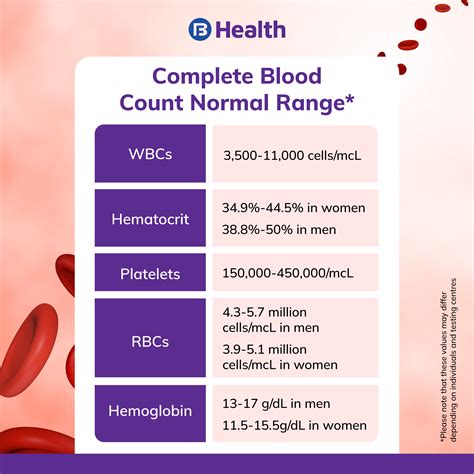Complete Blood Count: Know Your Health Status

The human body is a complex machine, with various components working in harmony to maintain overall health. One of the most critical aspects of health monitoring is the analysis of blood, which serves as a vital indicator of the body’s internal environment. A Complete Blood Count (CBC) is a comprehensive test that provides valuable insights into the body’s health status, enabling healthcare professionals to diagnose and monitor various conditions. In this article, we will delve into the world of CBC, exploring its components, significance, and implications for health and wellbeing.
Introduction to Complete Blood Count
A Complete Blood Count, also known as a full blood count, is a laboratory test that measures various parameters of blood, including the concentration of different blood cells, proteins, and other components. The test is usually performed on a blood sample drawn from a vein in the arm, which is then analyzed using specialized equipment. The results of a CBC test provide a detailed picture of the body’s hematological (blood-related) health, enabling healthcare professionals to identify potential issues and develop targeted treatment plans.
Components of a Complete Blood Count
A typical CBC test includes the measurement of several key components, each providing valuable information about the body’s health status. These components include:
- Red Blood Cell (RBC) count: Measures the number of red blood cells in the blood, which carry oxygen to the body’s tissues.
- White Blood Cell (WBC) count: Measures the number of white blood cells in the blood, which play a crucial role in immune function and infection response.
- Hemoglobin (Hb) level: Measures the amount of hemoglobin in the blood, which is a protein in red blood cells that carries oxygen.
- Hematocrit (Hct) level: Measures the proportion of red blood cells in the blood, which helps to diagnose conditions such as anemia.
- Platelet count: Measures the number of platelets in the blood, which are small cells that play a crucial role in blood clotting.
- Mean Corpuscular Volume (MCV): Measures the average size of red blood cells, which can help diagnose conditions such as anemia.
- Mean Corpuscular Hemoglobin (MCH): Measures the average amount of hemoglobin in red blood cells, which can help diagnose conditions such as anemia.
- Mean Corpuscular Hemoglobin Concentration (MCHC): Measures the average concentration of hemoglobin in red blood cells, which can help diagnose conditions such as anemia.
Significance of Complete Blood Count
A Complete Blood Count is a vital diagnostic tool, providing healthcare professionals with valuable insights into the body’s health status. The test can help diagnose and monitor various conditions, including:
- Anemia: A condition characterized by low red blood cell count or hemoglobin level.
- Infection: A high white blood cell count can indicate the presence of an infection.
- Blood disorders: Abnormalities in blood cell counts or morphology can indicate blood disorders such as leukemia or lymphoma.
- Blood clotting disorders: Abnormalities in platelet count or function can indicate blood clotting disorders such as thrombocytopenia.
- Immune system disorders: Abnormalities in white blood cell count or function can indicate immune system disorders such as HIV/AIDS.
Practical Applications of Complete Blood Count
The results of a CBC test have numerous practical applications in healthcare, including:
- Diagnosis: A CBC test can help diagnose various conditions, enabling healthcare professionals to develop targeted treatment plans.
- Monitoring: A CBC test can help monitor the progression of conditions, enabling healthcare professionals to adjust treatment plans as needed.
- Screening: A CBC test can help screen for potential health issues, enabling healthcare professionals to identify and address problems early.
Future Trends in Complete Blood Count
The field of hematology is constantly evolving, with advances in technology and diagnostic techniques enabling healthcare professionals to gain a deeper understanding of the body’s health status. Future trends in Complete Blood Count include:
- Automated analysis: The development of automated analysis systems, which can quickly and accurately analyze blood samples.
- Point-of-care testing: The development of point-of-care testing devices, which can enable healthcare professionals to perform CBC tests in clinics and other settings.
- Artificial intelligence: The integration of artificial intelligence and machine learning algorithms, which can help analyze CBC test results and identify potential health issues.
Thought Experiment: The Future of Blood Testing
Imagine a future where blood testing is no longer invasive, with devices that can analyze blood samples using non-invasive techniques such as optical spectroscopy. Such technology could revolutionize the field of hematology, enabling healthcare professionals to monitor the body’s health status in real-time. The implications of such technology would be profound, enabling individuals to take a proactive approach to their health and wellbeing.
Decision Framework: When to Get a Complete Blood Count
Deciding when to get a Complete Blood Count test can be a complex process, with various factors to consider. The following decision framework can help individuals determine when to get a CBC test:
- Symptoms: Are you experiencing symptoms such as fatigue, weakness, or shortness of breath?
- Medical history: Do you have a medical history of blood disorders or other conditions that may affect blood cell counts?
- Family history: Do you have a family history of blood disorders or other conditions that may affect blood cell counts?
- Age: Are you over 65, as age can increase the risk of blood disorders?
FAQ Section
What is a Complete Blood Count test?
+A Complete Blood Count test is a laboratory test that measures various parameters of blood, including the concentration of different blood cells, proteins, and other components.
What are the components of a Complete Blood Count test?
+A typical CBC test includes the measurement of several key components, including red blood cell count, white blood cell count, hemoglobin level, hematocrit level, platelet count, mean corpuscular volume, mean corpuscular hemoglobin, and mean corpuscular hemoglobin concentration.
Why is a Complete Blood Count test important?
+A Complete Blood Count test is a vital diagnostic tool, providing healthcare professionals with valuable insights into the body's health status. The test can help diagnose and monitor various conditions, including anemia, infection, blood disorders, and immune system disorders.
How often should I get a Complete Blood Count test?
+The frequency of CBC tests depends on various factors, including age, medical history, and symptoms. Individuals should consult with their healthcare professional to determine the best testing schedule for their needs.
Can a Complete Blood Count test be performed at home?
+No, a Complete Blood Count test typically requires a blood sample to be drawn from a vein in the arm, which is then analyzed in a laboratory. However, there are some point-of-care testing devices that can perform CBC tests in clinics and other settings.
In conclusion, a Complete Blood Count is a powerful diagnostic tool, providing healthcare professionals with valuable insights into the body’s health status. By understanding the components and significance of a CBC test, individuals can take a proactive approach to their health, working with healthcare professionals to identify and address potential issues early. As the field of hematology continues to evolve, it is likely that CBC tests will become even more important, enabling healthcare professionals to provide personalized care and improve health outcomes.



